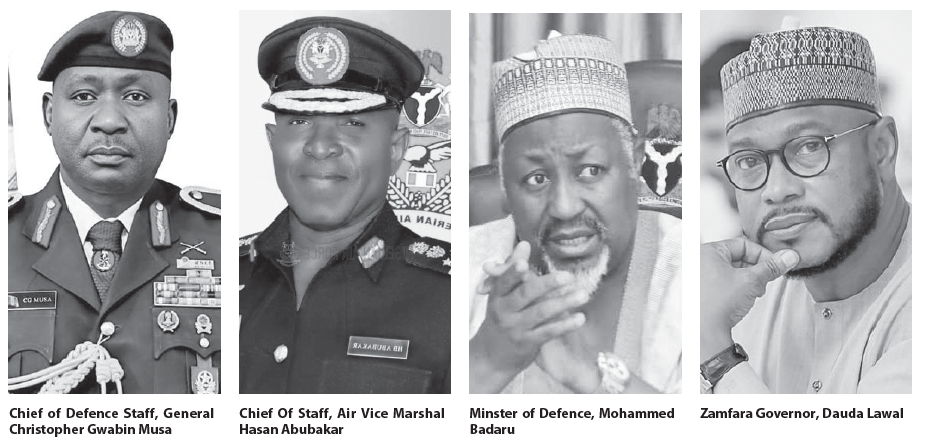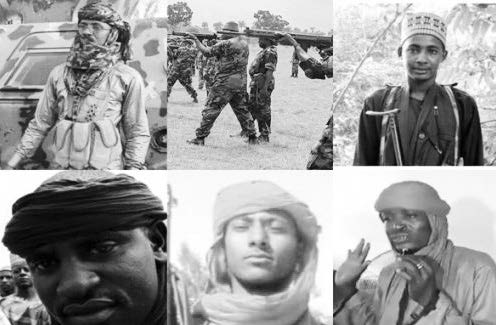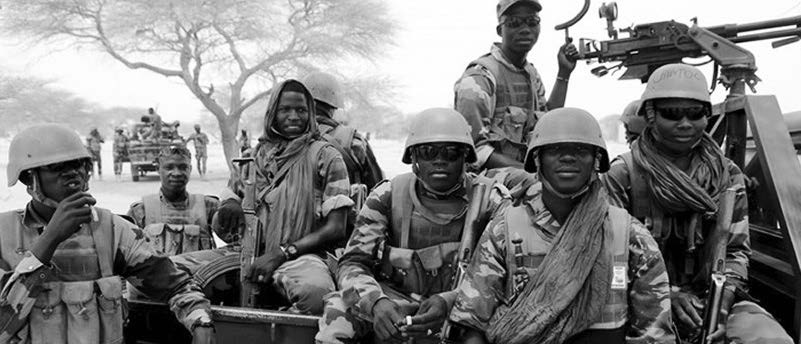-
With Sububu, Dangote, Buharin Yadi, Yellow, others downed, manhunt upped for Turji
-
We won’t rest until all bandits’ leaders face justice — Defence Chief
-
Politics, economy of region in comatose —Security Expert
From Femi Mustapha, in Kaduna
Since 2011, Nigeria’s North West region has grappled with multiple armed banditry, making it the current epicenter of terrorism in the country.
In Zamfara and Kaduna states alone, there have been over 4,758 reported
fatalities between 2018 and 2023, surpassing killings by terrorist groups in the North East over the same period.
The ‘armed bandits’ behind these violent activities constitute myriad groups operating under different gang leaders whose activities have included cattle rustling, kidnapping for ransom, artisanal gold mining, armed robberies, mass killings, rape and extensive destruction of crops, livestock, and property.
According to a Security expert, Dr. Yahuza Getso from Kano State, the analytical lens of criminal violence, the activities of armed bandits are a multifaceted security concern, with far-reaching implications for the economy and the politics of Nigeria’s North West region.
He added that banditry and long-standing conflicts between farming and pastoralist herder communities have worsened criminal violence in the area. He said that while many armed bandits are motivated by economic gains, some are moved by perceived injustices.

Getso added that It is increasingly recognized that organized crime has evolved into a significant political
force in many countries, establishing resilient organizations, amassing substantial resources and leveraging violence effectively with implications for politics.
Findings revealed that an estimated 30,000 bandits spread across numerous groups in northwest Nigeria, with each groups’ numbers ranging from 10 to over 1,000 fighters.
Banditry is a composite crime that includes kidnapping, massacre, rape, cattle rustling, and the illegal possession of firearms. The impact of their actions has been devastating, with a staggering 1,087,875 individuals in rural communities displaced as of December 2022. Furthermore, between 2010 and May 2023, approximately 13,485 deaths have been attributed to banditry.
The Nigerian government formally declared bandits as terrorists in November 2021. This designation meant tougher sanctions under the terrorism prevention act for suspected bandits, gunmen, as well as their informants and supporters, such as those caught in providing these criminals with arms, fuel, and food. More importantly, the federal government has considered counterinsurgency operations of deploying sophisticated military hardware against the bandits (in the context of international convention regarding how, when, and against whom such hardware can be used).
The tragic and brutal murder of the Emir of Gobir, Isa Bawa, in the hands of criminal bandits added yet another worrisome dimension to the security woes in Nigeria recently.
The monarch was, on July 29, kidnapped alongside his son and six others on the Sokoto-Sabon Birni Road and subsequently killed in cold blood inside a remote forest where he was held captive.
This heinous event occurred despite attempts to secure his release through ransom negotiations, which ultimately failed. Although local sources confirmed the emir’s death, there was a delay in official confirmation from the Sokoto state government and law enforcement agencies.
A few days after the death of the Royal father, bandits again abducted over 150 persons and rustled over 1,000 cattle in some villages in Gobir Emirate of Sokoto State.
This incident starkly illustrates the rising spate of violence in the north-west. This region remains severely affected by insecurity despite two influential defence ministers from the region — Muhammad Badaru Abubakar, the minister of defence, and Bello Matawalle, the minister of state for defence.
Although the minister of state for defense, Mohammed Bello Matawalle, had given a marching order to the chief of defence staff (CDS), General Christopher Gwabin Musa, to fish out the killers, this directive, according to many respondents, is not enough without the corresponding walk of the talk.
The orders to walk the talk came when President Bola Ahmed Tinibu who was on international engagement in China gave a directive to the Minister of State for Defence and military chiefs to relocate to Sokoto State to rid the North-west of bandits, it is expected that they will have no excuse not to end the activities of the notorious bandits’ leader, Bello Turji, and his gang, which has brought embarrassment to the Nigerian security forces and the country at large.

Obeying the order of its Commander in chief, the Nigerian military deployed its personnel to join the police and other security agencies in flushing out the bandits from the forest and ensuring the people were allowed to sleep with their two eyes closed.
This development has been responsible for a series of operations, where many armed bandits have been killed or arrested, their sanctuaries and assets destroyed, some of their attacks foiled or countered, hostages rescued and the lives and property of the affected population were protected, in manners that arguably minimize their threats in the region.
However, the greatest success of the fight was the neutralization of Halilu Sububu, who was a feared bandit leader responsible for numerous attacks and kidnappings across northern Nigeria. His vast network spread terror in rural communities, causing mass displacements and economic disruption.
Sububu’s ability to evade military operations made him a challenging target until his eventual death, which significantly weakened his group’s activities and restored some peace to affected areas.
Similarly, Dangote, a notorious bandit leader in Katsina State, who led a gang involved in kidnappings, robberies, and attacks on villages, was killed in a gun battle between his group and Kachalla Dankarami’s camp in the Dumbunrun Forest.
His death weakened bandit networks in the region, reducing violence and restoring a sense of security in Katsina.
In the same vein, Buhari Alhaji Halidu (aka “Buharin Yadi”) who terrorized citizens in Kaduna, Katsina, Niger, and Zamfara states through kidnappings, robberies, and killings, violent reign left many communities in fear, but his death in a military operation marked a turning point in the fight against banditry, bringing relief to those affected by his criminal activities.
There is the death of others like Boderi Isyaku who was behind the kidnapping of 39 students and the attack on the Nigerian Defence Academy in 2021, and his criminal activities caused widespread fear and unrest, especially in Kaduna State.
Believed to have been killed also were Kachalla Dan Chaki, Rufai Maikaji, Boderi Isyaku, Dogo Rabe, Dogo Gudali, Alhaji Auta and Kachalla Ruga.
However, one of the noticeable ones was the death of Yellow who operated multiple bandit camps across Zamfara, Kaduna, and Katsina states. His gang was involved in various criminal activities, including kidnappings and robberies.
Yellow was killed in air strikes by the Nigerian Airforce, which dismantled his operations and reduced bandit activities in the region.
Already, the Governor of Zamfara State, Dauda Lawal had hinted of the imminent death of Turji, indicating that with the swelling synergy between the military authorities and states in the North West, it is only a matter of time that Turji will be killed.
Responding to this development recently, the Chief of Defence Staff, General Christopher Musa, had emphasized the military’s determination to eradicate insecurity across Nigeria.
According to him, under his leadership, the military has adopted a multi-pronged approach, combining intelligence, community collaboration, and relentless air and ground operations.

“Insecurity is a complex issue, but our recent victories prove that we are on the right track. The Nigerian military is evolving to meet these challenges, and we will not rest until all bandit leaders are brought to justice,” General Musa said.
He also stressed the need for local communities to cooperate with the military by providing intelligence to help root out the remaining criminal elements.
However, security experts opined that the National Security Adviser Mallam Nuhu Ribadu’s trail of triumphs in tackling the security compromises he inherited has set him apart and the result is what is being witnessed in the theater of war with bandits.
Corroborating this, Adekunle Omolewa observed “The National Security Adviser, Nuhu Ribadu, recently called on security agencies in the country to adopt a holistic and forward-looking approach that addresses the causes of security challenges confronting Nigeria.”
The NSA, he said, had noted that it has become incumbent on them to reflect on the evolving nature of the security threats and identify innovative strategies as well as the needed partnership that would help to effectively overcome the scourge.
According to him, it’s easy to see how his background as a specialized police officer, lawyer, and fearless investigator and prosecutor of financial crimes has stood him out in the Office of the National Security Adviser (ONSA) in just one year in charge.
The NSA added that it has become incumbent on them to reflect on the evolving nature of the security threats and identify innovative strategies as well as the needed partnership that would help to effectively overcome the scourge.
The neutralization of these notorious bandit leaders represents a significant milestone in Nigeria’s ongoing battle against insecurity.
The military’s successes have sent a powerful message that no bandit leader is beyond the reach of justice. With the continued support of the government and local communities, the country moves closer to achieving lasting peace.
But Many Nigerians, especially in the North West of the Country, believe it’s not yet Uhuru for the military.
Mallam Haruna from Zurmi said the recent report that the bandits gathered at the home of Halilu Sububu to elect a new leader should not be swept under the carpet, a wake-up call to the gallant soldiers and other security agencies to up their game.
Authenticating this, Deaconess Deborah John from Katsina State advised that the efforts should be sustained and the government should give the troops the necessary support that will bring peace back to the country.
Deaconess Deborah John, however, stressed that the citizens have a great role to play by availing the security agencies with relevant information that will ease their operations.








